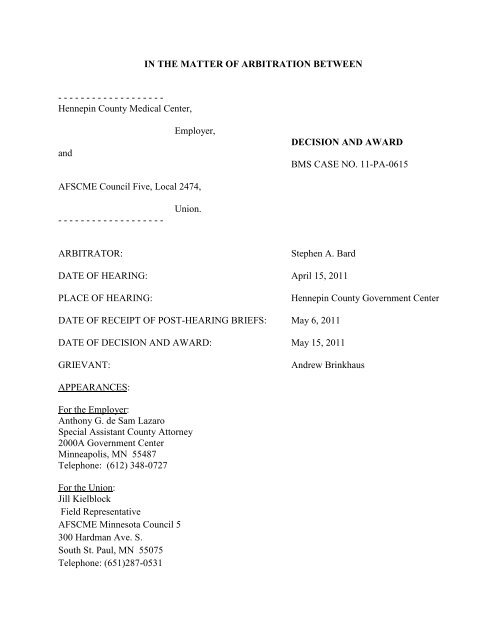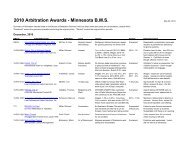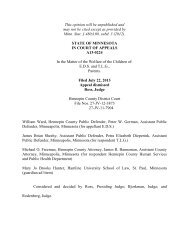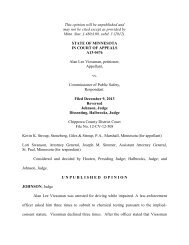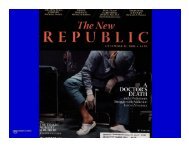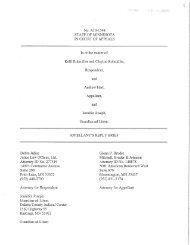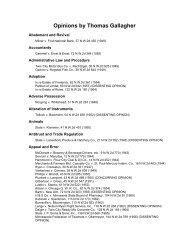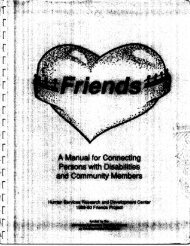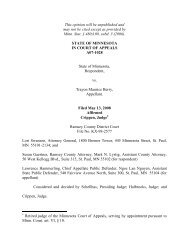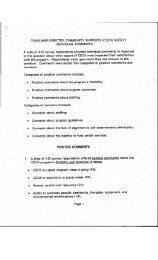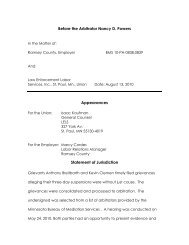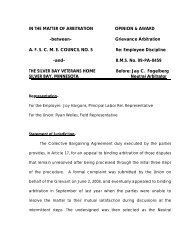IN THE MATTER OF ARBITRATION BETWEEN ... - Minnesota.gov
IN THE MATTER OF ARBITRATION BETWEEN ... - Minnesota.gov
IN THE MATTER OF ARBITRATION BETWEEN ... - Minnesota.gov
Create successful ePaper yourself
Turn your PDF publications into a flip-book with our unique Google optimized e-Paper software.
- - - - - - - - - - - - - - - - - - -<br />
Hennepin County Medical Center,<br />
and<br />
<strong>IN</strong> <strong>THE</strong> <strong>MATTER</strong> <strong>OF</strong> <strong>ARBITRATION</strong> <strong>BETWEEN</strong><br />
Employer,<br />
AFSCME Council Five, Local 2474,<br />
- - - - - - - - - - - - - - - - - - -<br />
Union.<br />
DECISION AND AWARD<br />
BMS CASE NO. 11-PA-0615<br />
ARBITRATOR: Stephen A. Bard<br />
DATE <strong>OF</strong> HEAR<strong>IN</strong>G: April 15, 2011<br />
PLACE <strong>OF</strong> HEAR<strong>IN</strong>G: Hennepin County Government Center<br />
DATE <strong>OF</strong> RECEIPT <strong>OF</strong> POST-HEAR<strong>IN</strong>G BRIEFS: May 6, 2011<br />
DATE <strong>OF</strong> DECISION AND AWARD: May 15, 2011<br />
GRIEVANT: Andrew Brinkhaus<br />
APPEARANCES:<br />
For the Employer:<br />
Anthony G. de Sam Lazaro<br />
Special Assistant County Attorney<br />
2000A Government Center<br />
Minneapolis, MN 55487<br />
Telephone: (612) 348-0727<br />
For the Union:<br />
Jill Kielblock<br />
Field Representative<br />
AFSCME <strong>Minnesota</strong> Council 5<br />
300 Hardman Ave. S.<br />
South St. Paul, MN 55075<br />
Telephone: (651)287-0531
<strong>IN</strong>TRODUCTION<br />
This matter came on for arbitration before Neutral Arbitrator Stephen A. Bard, on April 15,<br />
2011, at 9:00 a.m. in the Hennepin County Government Center in Minneapolis, <strong>Minnesota</strong>.<br />
The Employer was present with its witnesses and was represented by Mr. Anthony G. de Sam .<br />
Lazaro. The Union was present with its witnesses and was represented by Ms. Jill Kielblock.<br />
. The parties stipulated that there were no issues of timeliness or arbitrability and that the case<br />
was properly before the Arbitrator for a decision on the merits. Testimony and exhibits were taken<br />
at the time of the hearing and at the conclusion thereof the parties agreed to simultaneously serve<br />
and submit briefs on May 6, 2011.<br />
ISSUES<br />
1. Did the Employer violate the Collective Bargaining Agreement when it terminated the<br />
employment of the grievant?<br />
of this case.<br />
2. If so, what is the remedy?<br />
RELEVANT CONTRACT PROVISIONS<br />
The following provisions of the Collective Bargaining Agreement are relevant to a decision<br />
ARTICLE 33-DISCIPL<strong>IN</strong>E<br />
Section 1. The EMPLOYER will discipline employees in the classified service only for just cause.<br />
Section 2. Discipline, when administered, will be in one or more of the following forms and<br />
normally in the following order:<br />
A. Oral Reprimand<br />
B. Written Reprimand<br />
C. Suspension<br />
D. Discharge or disciplinary demotion.<br />
2
RELEVANT PROVISIONS <strong>OF</strong> HCMC POLICY ON RELEASE <strong>OF</strong> PROTECTED<br />
HEALTH <strong>IN</strong>FORMATION<br />
DEF<strong>IN</strong>ITIONS<br />
Protected Health Information: Individually identifiable information, including all medical,<br />
financial, and demographic information that is created, collected, or maintained by Hennepin<br />
County Medical Center (HCMC) relating to past, present, or future health care or payment for<br />
health care. Information may be gathered at the time of interview, examination, diagnosis,<br />
intervention, or treatment of the patient, and will be comprised of data in the institutional medical<br />
record, medical images, specimens marked with patient identifiers, and other ancillary materials.<br />
POLICY<br />
Protected Health Information shall be released only through patient consent or appropriate<br />
authorization and in compliance with applicable laws.<br />
Licensed registered nurses, members of the medical staff, residents/fellows, and dependent allied<br />
health professionals at Hennepin County Medical Center are the only individuals that respond to<br />
patient information requests on patient care areas over the telephone or in person.<br />
RELEVANT PROVISIONS <strong>OF</strong> HCMC POLICY ON PATIENT RIGHTS AND<br />
RESPONSIBILITIES<br />
All patients, patient’s guardian or representative have:<br />
…..<br />
12. The right to privacy.<br />
13. The right to confidentiality….<br />
17. The right to personal privacy<br />
RELEVANT PROVISIONS <strong>OF</strong> HCMC MCPO/SOC BEHAVIOR GUIDEL<strong>IN</strong>ES<br />
MCPO/SOC staff shall abide by all laws and HCMC policies regarding patient confidentiality….<br />
MCPO/SOC staff should immediately communicate to the Duty Security Supervisor all significant<br />
information they receive as part of their duties. Violations of law, ethics, or policy should be<br />
immediately reported to the Duty Security Supervisor.<br />
RELEVANT PROVISIONS <strong>OF</strong> HIPPA LAW AND REGULATIONS<br />
45 CODE <strong>OF</strong> FEDERAL REGULATIONS §160.103 Definitions<br />
Health information means any information, whether oral or recorded in any form or<br />
medium, that:<br />
3
(1) Is created or received by a health care provider, health plan, public health authority,<br />
employer, life insurer, school or university, or health care clearinghouse; and<br />
(2) Relates to the past, present, or future physical or mental health or condition of an<br />
individual; the provision of health care to an individual; or the past, present, or future<br />
payment for the provision of health care to an individual.<br />
Individually identifiable health information is information that is a subset of health<br />
information, including demographic information collected from an individual, and:<br />
(1) Is created or received by a health care provider, health plan, employer, or health care<br />
clearinghouse; and<br />
(2) Relates to the past, present, or future physical or mental health or condition of an<br />
individual; the provision of health care to an individual; or the past, present, or future<br />
payment for the provision of health care to an individual; and<br />
(i) That identifies the individual; or<br />
(ii) With respect to which there is a reasonable basis to believe the information can<br />
be used to identify the individual<br />
Protected health information means individually identifiable health information:<br />
(1) Except as provided in paragraph (2) of this definition, that is:<br />
(i) Transmitted by electronic media;<br />
(ii) Maintained in electronic media; or<br />
(iii) Transmitted or maintained in<br />
any other form or medium.<br />
(2) Protected health information excludes individually identifiable health information in:<br />
(i) Education records covered by the Family Educational Rights and Privacy<br />
Act, as amended, 20 U.S.C. 1232g;<br />
(ii) Records described at 20 U.S.C. 1232g(a)(4)(B)(iv); and<br />
(iii) Employment records held by a covered entity in its role as employer.<br />
F<strong>IN</strong>D<strong>IN</strong>GS <strong>OF</strong> FACT<br />
The Arbitrator finds that the following facts are either not in dispute or have been<br />
established by a fair preponderance of the evidence by the party having the burden of proof.<br />
1. The grievant began working at HCMC on August 18, 2008 as a Medical Center Protection<br />
Officer (MCPO). Prior to his discharge in 2010 which is the subject of this grievance, the grievant<br />
received two annual performance reviews in which he was judged “fully capable” in all aspects<br />
pertaining to his job performance. In July 2010, he was presented with an “Award of Valor” for<br />
4
outstanding dedication and bravery in dealing with a man with a gun outside the emergency<br />
department on July 21, 2010.<br />
According to the “Contact Record” which was introduced into evidence, in a little over two<br />
years of employment, the grievant received some measure of discipline, including six “coachings”<br />
over how to handle certain aspects of his job better, as well as two verbal reprimands. He also<br />
received several “Thank You” notes and kudos for positive action. Although not flawless, his<br />
overall job performance was positive and the negatives were within tolerable limits and subject to<br />
improvement with training and experience.<br />
2. In the case of HCMC’s Protection Officers, training related to patient privacy occurs at three<br />
points in time – 1) new employee orientation; 2) during the Field Training process; and 3) as part of<br />
an annual computer based confidentiality training. The evidence supports a finding that during the<br />
grievant’s new employee orientation, approximately one-half hour was spent addressing patient<br />
confidentiality through an introduction to HIPPA, the <strong>Minnesota</strong> Data Practices Act, and other<br />
related information.<br />
The unrefuted testimony of Protection Officer Denne Nelson provided information about the<br />
level of detail covered about patient confidentiality during the Field Training process. Officer<br />
Nelson testified that he is a long time employee of HCMC and has served as a Field Training<br />
Officer for many years. He testified about his own frustration at the lack of training provided about<br />
what HCMC obviously views as an important topic and indicated that as a Field Training Officer he<br />
had not been provided with any more detail than any other Protection Officer. His testimony about<br />
what is covered on the subject of HIPPA compliance and patient confidentiality as part of the Field<br />
Training Manual was that it is very sketchy and at best appears to simply reiterate the definition of<br />
Protected Health Information contained in the HCMC Policy. The field training does not contain<br />
5
situational specific information related to the duties of the HCMC Protection Officer.<br />
The third area of training involves the confidentiality training that is a computer-based<br />
program each HCMC employee must take annually. A review of the power point slides that are part<br />
of that training shows that there is no detailed discussion about when an individual becomes a<br />
patient or what protected health information is.<br />
Both Officer Rob Schoffstall and the grievant supported Officer Nelson’s testimony that the<br />
training they received was limited in terms of truly understanding how HIPPA related<br />
confidentiality concerns related to their normal job duties.<br />
3. The grievant was required to sign a confidentiality agreement annually, certifying that he<br />
understood the confidentiality rules under which he worked. That agreement states that “any data<br />
which the employee or agent is aware of should not be shared unless required by another employee<br />
in the performance of his/her duties,” and that employees “are responsible for complying with the<br />
various rules, regulations and laws <strong>gov</strong>erning the collection, creation, storage, maintenance,<br />
dissemination and access to data.” Above the signature line is an agreement that if the employee<br />
has any questions, he “will direct them to my supervisor or the Information Security & Privacy<br />
Officer.” The grievant testified that he thought he understood the rules and thus had no questions to<br />
ask. However, he also testified that the training was “incomplete,” “not applicable to his job,” and<br />
“confusing.”<br />
4. On August 21, 2010 two women came to the HCMC Emergency Department seeking<br />
treatment for one of the women who was bleeding from the face. Upon entering the triage area of<br />
HCMC, the individuals first approached Officers Brinkhaus and Meints who were in the area as part<br />
of their normal patrol. It was at that time that the grievant asked what had happened and was told<br />
that one of the women had been involved in a hit and run accident in which she ran into another<br />
6
vehicle and then left the scene. This interaction lasted approximately ten seconds before the<br />
grievant escorted the women to the triage desk. He then he stepped away for about a minute before<br />
walking back to the treatment area where the two women were speaking to the admitting nurse. He<br />
leaned over the desk and listened to the conversation between the patient and the nurse for about<br />
one minute before walking over to the security booth and calling the Minneapolis Police (MPD).<br />
The grievant testified that the only information that he overheard while leaning over the counter was<br />
of the “where does it hurt” variety.<br />
HCMC witnesses provided hearsay testimony that Officer Brinkhaus obtained the<br />
information he provided during the call to the police by “hanging out” at the triage area and hearing<br />
it during the intake interview. Yet they provided no first hand evidence via testimony of the nurse<br />
that was actually interacting with the individual nor written patient records as to what was actually<br />
discussed during the interaction between the nurse and the individual. The HCMC Triage nurse<br />
who testified was the nurse that filed the complaint, not the one that was actually involved in this<br />
situation. Therefore the grievant’s testimony about when he obtained the information that a hit and<br />
run had occurred stands effectively unrefuted.<br />
5. Whether the grievant consulted with other MCPOs on duty before calling the police was a<br />
matter of conflicting testimony. The grievant testified that he consulted both MCPO Brittany<br />
Meints and MCPO Cody Larson before calling, while Mr. Larson testified that this was not the case.<br />
The Arbitrator has not resolved this fact issue since he deems it ultimately unimportant to a decision<br />
of this case.<br />
6. The phone call to the MPD was recorded and the recording and a transcript of it were<br />
introduced into evidence. On the recording of the phone call, the grievant can be heard stating to<br />
someone that “she’s fucking drunk” before the dispatcher picks up the line. He tells the police<br />
7
dispatcher that a girl had just come into the hospital “all messed up” and that she “smell[ed] of<br />
alcohol” and that she had told him she may have been in a hit and run on Hennepin Avenue.. The<br />
grievant also ascertained and disclosed to the dispatcher the make, model, and color of the vehicle<br />
that the patient had been driving. At the end of the call, the grievant asked “So, if you want to send<br />
a car over?”<br />
7. The grievant testified that he intended to notify his supervisor, John Gravermoen, about the<br />
incident after it occurred but simply hadn’t yet had a chance to do so. Mr. Gravermoen testified that<br />
he was available via phone and/or walkie-talkie within moments. Furthermore, by the time that Mr.<br />
Gravermoen was made aware of the incident by way of Charge Nurse Jean Tersteeg, the police had<br />
already arrived and visited the patient’s room. The statement of MCPO Brittany Meints states that<br />
this was at least 30-40 minutes after the call had been made. This provided the grievant with ample<br />
time to report to his supervisor what had happened, as is required by HCMC policy.<br />
8. An “event form” alleging a possible violation of HIPPA rules by the grievant was filed by<br />
charge nurse Jean Tersteeg. The grievant then filed an Incident Report stating his version of events.<br />
In that report he stated, inter alia, that after speaking with Supervisor Gravermoen about the matter,<br />
he was informed that “…per HIPPA, we are not to call Law Enforcement about any patient in the<br />
hospital.” He stated he was unaware of this as were other officers on the shift. An investigation<br />
followed which ultimately led to the termination of the grievant’s employment on September 21,<br />
2011. The reasons stated for the termination were that the grievant had acted outside the scope of a<br />
Protection Officer, that he had shared protected health information with authorities that led to their<br />
identification of the owner of a car involved in a hit and run accident, that his intention in making<br />
the call to the police was not, as he contended, motivated by a genuine concern for public safety,<br />
and that his actions had violated not only HIPPA, but also HCMC’S policies on Release of<br />
8
Protected Health Information, Patient Rights and Responsibilities, and Security Department policy<br />
B-3 MCPO/SCC Behavior Guidelines. This grievance followed.<br />
POSITION <strong>OF</strong> <strong>THE</strong> EMPLOYER<br />
The Employer’s arguments in defense of its actions are summarized below.<br />
1. The grievant’s testimony had numerous inconsistencies. In addition, his complaints about<br />
inadequate training are contradicted by the forms he signed acknowledging that he had received the<br />
training and that he understood the requirements of HIPPA regulations and HCMC Policies.<br />
2. The young woman became a patient as soon as she walked into the emergency department<br />
doors. While the HIPAA regulations do not define explicitly when a person becomes a “patient,”<br />
the preamble to the federal regulations does address the precise situation presented here.<br />
The definition of protected health information, for instance,<br />
would now apply to a statement by a patient that is<br />
overheard by a hospital security guard in a waiting room.<br />
Such a statement would have been outside the scope of the<br />
proposed rule (unless it was memorialized in an electronic<br />
record), but is within the scope of the final rule.<br />
Standards for Privacy of Individually Identifiable Health Information, 65 Fed. Reg. 82,462, at<br />
82,539 (Dec. 28, 2000) (emphasis added). In addition, HCMC policies generally presume that an<br />
individual who arrives at the hospital is a patient before they are registered.<br />
3. The information Mr. Brinkhaus disclosed to the police was the make, model and color of the<br />
car the patient drove, that she smelled of alcohol and that she had been involved in a hit and run.<br />
The patient’s friend shared that information orally with the grievant. This transmission is Protected<br />
Health Information (“PHI”) under its definition in 45 C.F.R § 160.103 (2010).<br />
4. HIPAA exceptions allowing disclosure of PHI do not apply.<br />
5. The grievant’s intent in making the phone call to the police was not actually concern for a<br />
9
victim or public safety.<br />
6. Even if the grievant’s actions somehow did not constitute a HIPAA violation, they clearly<br />
were serious policy violations. All of the language in the HIPAA regulations regarding permissive<br />
disclosures refers to actions on the part of the “Covered Entity.” HCMC Policy is quite clear as to<br />
whose role it is to contact law enforcement officials when appropriate, in other words who is<br />
authorized to act on behalf of the covered entity in such situations.<br />
The HCMC Policy on the Release of Protected Health Information in person, and by<br />
telephone clearly states that “Licensed registered nurses, members of the medical staff,<br />
residents/fellows, and dependent allied health professionals at Hennepin County Medical Center are<br />
the only individuals that respond to patient information requests on patient care areas over the<br />
telephone or in person. . . Nowhere in the policy are Protection Officers like Mr. Brinkhaus<br />
authorized to disclose such information either in responding to requests or by affirmatively reaching<br />
out to the police.<br />
7. Violation of patient confidentiality is very serious. Numerous courts have concluded that an<br />
employee disclosing confidential information warrants discharge.<br />
8. The grievant’s conduct during the investigation was an aggravating factor. It was felt that<br />
he was not forthcoming during the investigation and at the investigatory meeting would only answer<br />
questions by reading from his incident report. There were also inconsistencies in his statements.<br />
POSITION <strong>OF</strong> <strong>THE</strong> UNION<br />
The arguments of the Union in support of the grievance can be summarized as follows:<br />
1. The information disclosed by the grievant to the police was not “Health Information”,<br />
10
“Protected Health Information” nor “Individually Identifiable Health Information” as those terms<br />
are defined in the HIPPA law and applicable regulations. All three definitions indicate that the<br />
information “relates to the past, present, or future physical or mental health or condition of an<br />
individual; the provision of health care to an individual; or the past, present, or future payment for<br />
the provision of health care to an individual.”<br />
2. The grievant’s training on HIPPA and patient confidentiality was cursory and inadequate<br />
and did not prepare him to interpret properly intricate and technical regulation language as it applied<br />
to this situation. The determination that an employee makes about what information can or cannot<br />
be released is more a matter of what information an employee is able to glean from the training<br />
provided to him along with his experience in applying that training, than what the formal definitions<br />
are in the law or regulation.<br />
3. There was also confusion as to when an individual is considered to be a patient. Even<br />
though Ms. Reidun Hanson, the Information and Security and Privacy Officer at HCMC, testified<br />
that in her opinion one becomes a patient the minute he or she enters HCMC property, she<br />
acknowledged that it is not clearly defined in HIPPA regulations or in any of the policies that are<br />
referenced in the grievant’s letter of termination. The definition of “patient” also does not appear to<br />
be covered in the training that is provided to HCMC employees and to Protection Officers in<br />
particular. HCMC wants to hold the grievant accountable for a level of knowledge based on Ms.<br />
Hanson’s interpretation, but that information was never communicated to him. A reasonable<br />
assumption is that one becomes a patient when one has gone through triage and is formally admitted<br />
to HCMC. The information that Officer Brinkhaus obtained and used in making the determination<br />
to initiate the call to Minneapolis Police and Fire Emergency Call Center was obtained prior to the<br />
triage process. Therefore in his mind it was acceptable to discuss information received since the<br />
individual was not yet a patient of HCMC.<br />
11
4. Most calls to police, fire and emergency personnel at HCMC go through the internal call<br />
center and a dispatcher makes the actual contact. However nothing in any of the policies cited in<br />
the grievant’s termination letter, the Protection Officer job description or the Field Training Manual<br />
require such a process in every situation. HCMC witness Gravermoen indicated that although he<br />
believes Officer Brinkhaus should have consulted with a supervisor prior to making the call there<br />
was no hard and fast directive that supervisors must be contacted before making contact with police,<br />
fire and emergency personnel. In fact, Officer Brinkhaus’ explanation of making the call since he<br />
was close to the individual involved in case additional information was required makes sense.<br />
. DISCUSSION<br />
BURDEN AND QUANTUM <strong>OF</strong> PRO<strong>OF</strong><br />
The burden of proving “just cause” for discipline is on the employer. The burden must be<br />
carried by a fair preponderance of the evidence. Elkouri and Elkouri, How Arbitration Works,<br />
Sixth Edition, pp. 949-950.<br />
DID <strong>THE</strong> GRIEVANT VIOLATE <strong>THE</strong> HIPPA LAW OR REGULATIONS?<br />
Was the disclosed information “Health Information” as defined in 45 CFR §160.103?<br />
The information disclosed to the police consisted of the make, model, color and year of the<br />
woman’s car, the fact that she appeared to be drunk, and that she had admitted to having been in a<br />
hit and run accident. The definition of “Health Information” includes oral as well as written<br />
information created or received by a health care provider and “… relates to the past, present, or<br />
future physical or mental health or condition of an individual; the provision of health care to an<br />
individual; or the past, present, or future payment for the provision of health care to an individual.”<br />
12
The information provided to the police by the grievant did not relate to her health, her medical<br />
condition, her treatment, or payment. It was clearly not “Health Care Information.”<br />
Was the disclosed information “Individually Identifiable Health Information” as defined in 45 CFR<br />
§160.103?<br />
“Individually Identifiable Health Information” is defined as a “subset” of Health<br />
Information. Since the information was not “Health Information,” it is also not “Individually<br />
Identifiable Health Information” even though the information could and did help identify the<br />
individual involved in the hit and run accident.<br />
Was the disclosed information “Protected Health Information” as defined in 45 CFR §160.103?<br />
Since the Arbitrator has concluded that the disclosed information did not constitute either<br />
“Health Information” or “Individually Identifiable Health Information,” it follows that it also can<br />
not be considered “Protected Health Information” within the meaning of HIPPA and its regulations.<br />
However there is an additional reason to support this conclusion. “Protected Health Information” is<br />
defined as “individually identifiable health information” which:<br />
“(1) Except as provided in paragraph (2) of this definition, is:<br />
(i) Transmitted by electronic media;<br />
(ii) Maintained in electronic media; or<br />
(iii) Transmitted or maintained in<br />
any other form or medium.”<br />
The disclosed information was obtained verbally and clearly falls outside of the above<br />
definition of. “Protected Health Information.”<br />
The Arbitrator has arrived at the above interpretation of the HIPPA Regulations based on the<br />
plain, clear, and unambiguous meaning of the words. All statutes and regulations are to be<br />
construed in that fashion and in accordance with the purpose and intent of the law. Clearly, in<br />
passing HIPPA, Congress intended to safeguard the confidentiality of medical records which consist<br />
13
of information pertaining to a patient’s health, medical condition, and treatment. Not every word<br />
uttered in a hospital falls into that category or within a zone of a patient’s reasonable expectation of<br />
privacy. If, to take an extreme example, a Security Officer walking down the hall of a hospital in<br />
the course of his duty passed a room with an open door and overheard a patient confessing to a<br />
visitor that he had committed a robbery the day before he was admitted, no reasonable interpretation<br />
of the words of the HIPPA regulations would make that “health information”, protected or<br />
otherwise.<br />
The application of the HIPPA Regulations to the instant fact situation requires an<br />
interpretation of definitions and exceptions which is subtle and technical. For example, Mr. Martin<br />
Williams, the Director of Security and Parking for HCMC, participated in the decision to terminate<br />
the grievant’s employment. Under cross-examination, Mr. Williams admitted that he was unable to<br />
definitely answer whether or not the information given to the police by the grievant constituted a<br />
“permitted disclosure” within the meaning of 45 CFR §164,512 (6). If a man with his expertise on<br />
the subject cannot be sure of that answer, it seems to this Arbitrator patently unreasonable to require<br />
the grievant, with his very limited training on the subject, to understand the application of the<br />
regulations to this situation.<br />
The Arbitrator’s decision that grievant did not disclose Protected Health Information makes<br />
it unnecessary to consider the issues of when a person becomes a “patient” and whether any of the<br />
exceptions to non-disclosure of Protected Health Information apply.<br />
Did the grievant violate any of the HCMC Policies in his call to the police?<br />
In light of his conclusion that the revealed information was not “Protected Health<br />
Information,” its disclosure to the police did not violate HCMC’s policy against release of such<br />
information. Similarly, the Arbitrator does not consider that its release violated the Policy on<br />
14
Patient’s Rights and Responsibilities.<br />
The same is not the case in regard to the HCMC MCPO/SOC Behavior Guidelines which<br />
provides in relevant part that “MCPO/SOC staff should immediately communicate to the Duty<br />
Security Supervisor all significant information they receive as part of their duties. Violations of<br />
law, ethics, or policy should be immediately reported to the Duty Security Supervisor.” The<br />
grievant did not follow this procedure and, accordingly, violated this policy which properly<br />
subjected him to some form of discipline. This is an important matter since any organization like a<br />
hospital must necessarily maintain a clear chain of command and responsibility in order to properly<br />
manage its affairs. In taking it upon himself to call the police instead of reporting it to his<br />
Supervisor, the grievant exceeded the scope of his authority.<br />
Was termination of employment appropriate discipline?<br />
The employer argues that disclosure of Protected Health Information is serious enough to<br />
warrant discharge and cites several cases in support of that position. Although it is not strictly<br />
necessary to a decision of this case in light of the holding that the grievant did not disclose<br />
Protected Health Information, a brief discussion of those cases may be helpful in future situations.<br />
In the Arbitration between the University of <strong>Minnesota</strong>, Boynton Health Clinic and<br />
AFSCME Council 5 , Local 3260, BMS CASE NO. 09-PA-0140, the grievant was terminated for<br />
disclosing protected health information to the police. The case is distinguishable in that there was<br />
no question that the information that was disclosed was protected health information. The issue was<br />
whether or not it fell under the “emergency” exception allowing disclosure in response to a police<br />
request. Arbitrator Miller concluded that the exception did not apply, that the grievant had in fact<br />
violated HIPPA, but that under all of the circumstances the discipline of termination was too severe.<br />
15
UHC Management Company, Inc. v. Fulk is an unpublished opinion of the <strong>Minnesota</strong> Court<br />
of Appeals from 1995. As such it may not be cited as binding precedent on lower courts. The<br />
Respondent had accessed the private medical records of a subscriber who had been involved with<br />
his domestic partner in order to learn medical information that could affect his health status. He<br />
divulged that information to his partner. The Court of Appeals held that this constituted misconduct<br />
justifying his discharge and disqualifying him from receiving unemployment insurance benefits.<br />
While agreeing with the decision, the Arbitrator does not believe that it has direct applicability to<br />
this case.<br />
In summary, the Arbitrator has decided that:<br />
1. The grievant did not disclose Health Information, Individually Identifiable Health Information,<br />
or Protected Health Information in violation of HIPPA. Even if his actions did constitute a violation<br />
of HIPPA, his training was inadequate to allow him to understand what was required of him or<br />
forbidden to him in these circumstances. The lack of sufficient training is not rendered moot by his<br />
signature on the training forms.<br />
2. The grievant did not violate the HCMC Policy on Release of Protected Health Information.<br />
3. The grievant did not violate the HCMC Policy on Patient’s Rights and Responsibilities.<br />
4. The grievant did violate HCMC MCPO/SOC Behavior Guidelines by failing to report the matter<br />
to his Supervisor promptly and taking it upon himself to call the police.<br />
5. Overall, the grievant has a good employment record and is unlikely to repeat this offense under<br />
similar circumstances. The purpose of progressive discipline is to teach, not punish, and it is clear<br />
that the grievant has learned a painful lesson from this episode.<br />
6. Termination of Employment is too severe a discipline for the offense actually committed. The<br />
grievant was discharged without just cause. In the opinion of the Arbitrator, an appropriate penalty<br />
16
would be a written warning for failure to notify his Supervisor in a timely fashion and exceeding the<br />
scope of his authority in calling the police to report the incident..<br />
DECISION AND AWARD<br />
For the above stated reasons the grievance is sustained. The termination of grievant’s<br />
employment is reduced to a written reprimand consistent with this opinion. The grievant is<br />
reinstated to his job immediately with full back pay and no loss of seniority. The employer is<br />
entitled to credit for all money earned by the grievant since his termination as well as any money<br />
received as unemployment compensation benefits.<br />
17<br />
Respectfully Submitted<br />
Stephen A. Bard, Arbitrator


